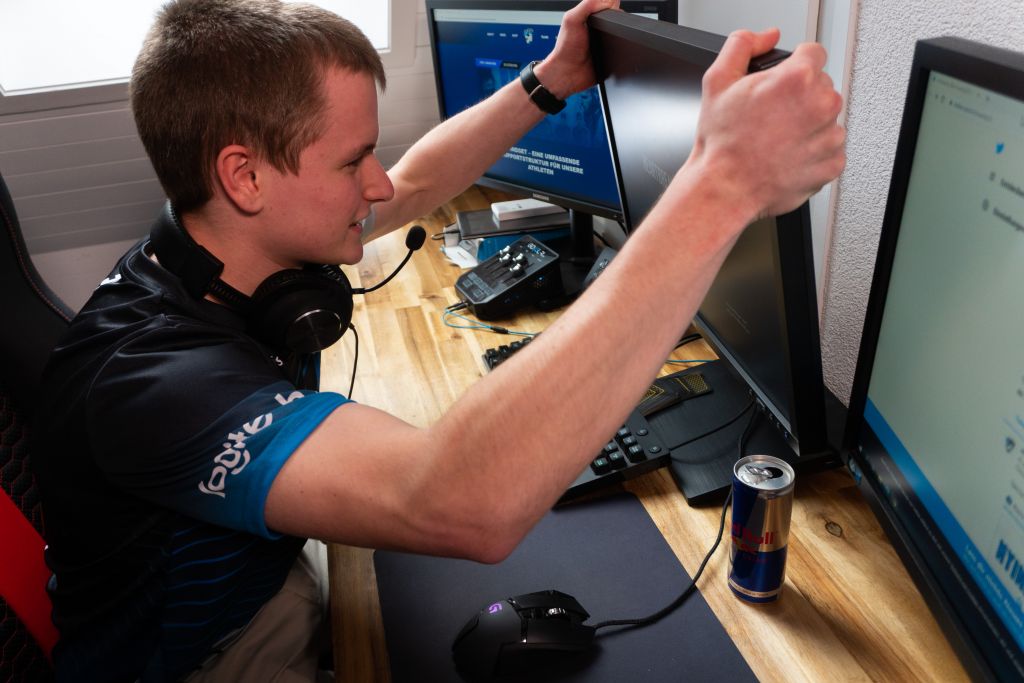Video games have traditionally been titled the bad boy of past-times by many a parent or teacher. There is a large number of articles and studies suggesting negative consequences of video game playing and the media especially is always quick to highlight solely negative impacts of video games.
As video game lovers and patrons of professional video gaming, we battle these negative stereotypes daily. If they were all true, could we justify supporting young athletes in devoting their life to video games and esports?
In this article, I will dive into some newer research on video games and aggression, but also the relation to emotion and emotion regulation. Mind you, this is not a systemic review and I will not be able to take every single study into account. I will try, however, to highlight some positive aspects of video games that were found in newer research.
I’m sure most of you have had the pleasure to watch the short video of a raging kid in front of a PC that absolutely wreaks havoc on his keyboard because he can’t log into his favourite game. “ICH WILL UNREAL TOURNAMENT SPIELEN” is a classic meme we all know and love (or hate). However, evidence suggests that the association of video games with negative emotional outbursts is not just overdrawn, but on the contrary, that video games could potentially be a learning opportunity to acquire and train emotion regulation abilities.
–
What is Emotion Regulation?
–
Emotion Regulation is the ability to exert control over one’s own emotional state, including mood, as well as positive and negative affect and is relevant in promoting mental health and wellbeing. There are several aspects of video games that potentially test and train the players’ emotion regulation ability, such as sense of mastery, frustration related to gameplay difficulty, but also the exposure to and reappraisal of negative emotional stimuli (Villani et al., 2018).
–
Research
–
A set of studies investigating gaming activity in everyday life (non-experimental) found that persons who played video games regularly were more adept in regulating their emotions and expressed them less often. They were also less prone to be emotionally reactive (Wack and Tantleff-Dunn, 2009).
In a longitudinal cohort study with children, their consumption of electronic media generally and video games specifically was associated with better intrapersonal abilities and stress management skills (Hinkley et al., 2017). Furthermore, it has been shown that casual video game playing can be used as a distraction from negative mood and successfully serves as a resource for mood repair/lifting (Russoniello et al., 2009). This could be due to the fact that In-Game success satisfies the need for competence and autonomy, which in turn positively influences your mood (Rieger et al., 2014). Even violent video games are potentially good mediums to reduce the impact of real-life frustrations on depressed mood and hostile feelings (Ferguson and Rueda, 2010).
The findings above suggest that video games offer a variety of different opportunities for emotion regulation. On one hand, they are accessible and fun resources for a mood boost, both through distraction from negative emotions and thoughts, but also through producing positive emotions as a result of experiencing competence and autonomy. On the other hand, video games offer a safe environment to make negative experiences and successfully cope with them. If transferred from video game to real life – and Hinkley et al. (2017) showed that even young children are capable of doing so – gaming could provide a big advantage in learning an important life skill. However, there’s reason to believe that the formula is not ‘more = better’ and that found positive effects of regular video gaming might vanish or turn into negative effects in association with excessive gaming (Seo et al., 2012).
–
Video Games and Aggression
–
Now, let us address the elephant in the room. Do violent video games facilitate or encourage aggression in players?
This is a topic that is not just discussed frequently in news and talk-shows, but also wildly disputed in current research. Even though a massive body of studies and meta-analyses report a significant and often causal relationship between violent video games and aggression (Anderson et al., 2010), newer studies are questioning that claim.

–
Research
–
It is unclear whether violent video games lead to the development of aggression, or whether people who are more prone to aggression tend to pick up violent video games (Which we would call a selection-effect). Therefore, Breuer et al., (2015) investigated whether the consumption of violent video games predict physical aggression or whether aggression predicts the use of violent games.
Their results show that teens between 14 to 17 years follow the selection hypothesis, with people reporting higher levels of aggression more likely to pick up a violent video game. Their second sample of 18-21 year olds was inconclusive and therefore suggests that there are other factors that influence the relationship between video games and aggression.
Such factors could be gender, family background and experience of real life violence according to DeCamp and Ferguson (2017). Especially having been hit by an adult themselves, as well as experiencing excessive yelling or violence at home were associated with a higher risk of aggressive behavior (here: hitting someone). Furthermore, indicators of home environment, the relationship with parents, and demographics (age, gender, race) all were stronger predictors of violent behavior than video game play. Overall, DeCamp and Ferguson (2017) conclude that time spent playing violent video games has very little to no role in youth violence.
Equally compelling evidence was found in a study comparing two groups of college students, one playing The Sims 3 and the other playing GTA V for several months. No significant difference was found between the groups in regards to aggression, impulsivity, anxiety, empathy or cognitive control on behavior. Kühn et al., (2018) therefore conclude that moderate violent video game consumption has no negative effects on aggression and prosocial behavior.
–
Take Home Message
–
It has been shown that the consumption of violent media (for example; movies, violent sports, music lyrics, recordings of real life violence or comic books) significantly contributes to aggression (Anderson et al., 2017). Since some video games also fall under ‘violent media’, these findings are also true for those video games. However, contrary to many reports, there doesn’t seem to be a stronger effect for video games compared to other violent media. If anything, video games offer opportunities to train emotion regulation and explore and cope with negative emotions such as aggression. In many ways, moderate consumption of video games seems to positively contribute to the emotional wellbeing of the player.
Literature:
Hinkley T, Timperio A, Salmon J, Hesketh K. (2017). Does preschool physical activity and electronic media use predict later social and emotional skills at 6 to 8 years? A cohort study. J Phys Activity Health 14:308–316.
Breuer, J., Vogelgesang, J., Quandt, T., & Festl, R. (2015, February 16). Violent Video Games and Physical Aggression: Evidence for a Selection Effect Among Adolescents. Psychology of Popular Media Culture. Advance online publication. http://dx.doi.org/10.1037/ppm0000035
DeCamp, W., Ferguson, C.J. (2017). The Impact of Degree of Exposure to Violent Video Games, Family Background, and Other Factors on Youth Violence. Journal of Youth Adolescence 46:388-400.
Ferguson CJ, Rueda SM. (2010). The Hitman study: Violent video game exposure effects on aggressive behavior, hostile feelings, and depression. Eur Psychol 15:99–108.
Rieger D, Wulf T, Kneer J, et al. (2014) The winner takes it all: The effect of in-game success and need satisfaction on mood repair and enjoyment. Comput Hum Behav 39:281–286.
Russoniello CV, O’Brien K, Parks JM. (2009). The effectiveness of casual video games in improving mood and decreasing stress. J Cyber Ther Rehabil 2:53–66.
Seo M, Kang HS, Chae S-M. (2012). Emotional competence and online game use in adolescents. Comput Inform Nurs 30:640-6-8.
Wack E, Tantleff-Dunn S. (2009). Relationships between electronic game play, obesity, and psychosocial functioning in young men. Cyberpsychol Behav Soc Network 12:241.
Kühn S, Kugler DT, Schmalen K, Weichenberger M, Witt C, Galliant J. (2019). Does playing violent video games cause aggression? A longitudinal intervention study. Molecular Psychiatry 24:1220-1234.Anderson, C. A., Suzuki, K., Swing, E. L., Groves, C. L., Gentile, D. A., Prot, S., Lam, C. P., Sakamoto, A., Horiuchi, Y., Krahé, B., Jelic, M., Liuqing, W., Toma, R., Warburton, W. A., Zhang, X.-M., Tajima, S., Qing, F., & Petrescu, P. (2017). Media Violence and Other Aggression Risk Factors in Seven Nations. Personality and Social Psychology Bulletin, 43(7), 986–998. https://doi.org/10.1177/0146167217703064
